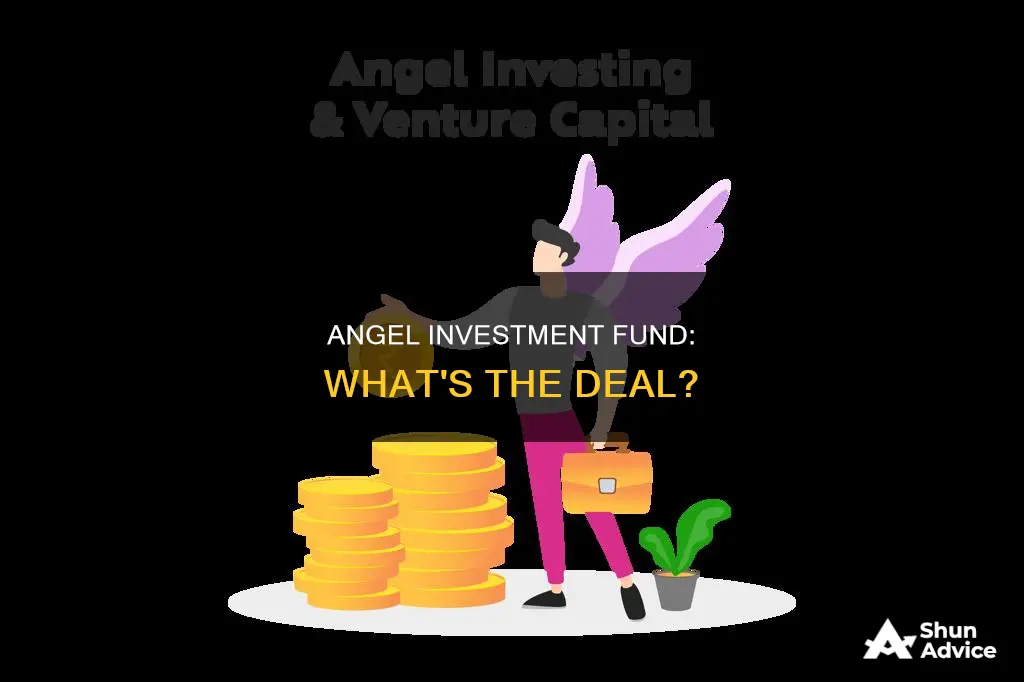
Angel investors are wealthy individuals who invest their own capital in startups during the early stages of development, receiving an ownership stake in return. Angel investors provide seed money to startups in exchange for equity in the company if the idea is successful. They are often retired entrepreneurs or executives who are interested in angel investing for reasons beyond pure monetary return, such as staying abreast of current developments in a particular business arena or mentoring another generation of entrepreneurs. Angel investors can also form groups or networks to share investment capital and provide advice to their portfolio companies.
| Characteristics | Values |
|---|---|
| Definition | Angel investors are wealthy private investors who provide capital to small businesses, often start-ups, in exchange for equity. |
| Investor Type | Individuals, trusts, businesses, limited liability companies, investment funds, or other vehicles. |
| Investment Type | Angel investors provide seed money, convertible debt, or ownership equity. |
| Investment Size | Investments can range from a few thousand to a few million dollars. |
| Investor Profile | Angel investors are often retired entrepreneurs or executives. They are typically accredited investors with a net worth of $1 million or more, or an annual income of $200,000 (or $300,000 for couples). |
| Investment Focus | Angel investors fund businesses in various industries, including healthcare, software, biotech, industrial, retail, and IT services. |
| Investment Stage | Angel investors often provide funding at an early stage when most other investors are not willing to back the business. |
| Investment Expectations | Angel investors seek high returns (e.g., 20-30% internal rate of return) due to the high risk of their investments. They typically want 10-50% equity in the business and may seek a seat on the board. |
| Investment Networks | Angel investors may operate individually or through angel groups or networks, pooling their funds and sharing investment opportunities. |
| Investment Sources | Entrepreneurs can find angel investors through online platforms, social media, local business organisations, and professional networks. |
What You'll Learn

Angel investors vs venture capitalists
Angel investors and venture capitalists (VCs) are both essential sources of funding for early-stage startups, but they differ in several key ways. Understanding these differences is crucial for entrepreneurs seeking investment, as it will help them decide which route to take when raising capital.
Angel investors are typically high-net-worth individuals who invest their own money into startups and early-stage companies, often in exchange for equity. They may be retired professionals or wealthy friends and family members who are looking for a project that appeals to them and that they can get personally involved with. Angel investors usually provide smaller amounts of funding, typically ranging from $10,000 to $1 million, which is crucial for seed and early-stage startups to develop prototypes and conduct market research. They often have a more flexible and faster decision-making process and are willing to take on higher risks. Angels also bring industry expertise and hands-on business experience, often providing mentorship and direct support to entrepreneurs.
On the other hand, venture capitalists are professional groups or firms that manage pooled funds from multiple investors, including investment companies, large corporations, and pensions. They invest larger amounts of capital, usually in the millions, to fund high-growth startups and small businesses. VCs typically get involved during later stages of a company's growth, such as Series A rounds and beyond. Due to the larger investment size, VCs conduct more extensive due diligence and often take a more hands-on role in the company's operations and strategic decisions. They offer extensive resources, strategic guidance, and a broad network of industry connections to help scale the business rapidly.
In summary, angel investors are individuals who invest their personal funds and tend to be more hands-on, flexible, and involved in the early stages of a startup. Venture capitalists, on the other hand, are professional firms that manage larger pools of funds and typically invest during later stages of a company's growth, offering more extensive resources and connections. Both play vital roles in the entrepreneurial ecosystem, and the choice between the two depends on the specific needs and stage of the business.
Real Estate Funds: Invest Now or Miss Out?
You may want to see also

How to find angel investors
Angel investors are wealthy individuals who invest their own money in high-growth businesses, usually in exchange for convertible debt or ownership equity. They are often retired entrepreneurs or executives who are interested in angel investing for reasons beyond pure monetary return. They are often the first to invest in early-stage businesses, providing seed funding.
Networking
Start by connecting with other entrepreneurs in your industry and finding out how they met their investors. Networking events are also a great way to meet potential investors in person. You can also look for industry events in your local community or nearby cities, such as TechCrunch, which regularly runs events to help startup owners connect with potential investors.
Online Platforms
There are several online platforms that connect startups with angel investors, such as AngelList, Angel Capital Association, Gust, Angel Forum, and Angel Investment Network. These platforms allow you to create a profile, gain exposure, and connect with potential investors.
Social Media
Social media platforms, especially Twitter, have become a popular way to connect with angel investors. By being vocal about your startup journey and documenting your progress, you can build an audience and make it easier for investors to find you.
Friends and Family
Consider reaching out to your friends and family who may be interested in investing. This option has been used by many famous startups in the past, but it's important to remember that investing from friends and family can sometimes complicate relationships if your startup doesn't succeed.
Direct Contact
You can also try reaching out directly to potential investors through cold messaging on LinkedIn or email. When reaching out, be concise, clear about what you do, and explain why you're a good fit for each other. Attach your pitch deck to provide more information.
Angel Networks
Connect with angel networks such as the National Angel Capital Organization (NACO) in Canada or similar organizations in your country. These networks provide access to a directory of potential investors and can make it easier to find those interested in your specific industry or location.
Business Accelerators
Business accelerators, such as the one suggested by Dominique Bélanger, Managing Director of Growth Venture Co-Investment Fund, give developing companies access to mentorship, investors, and other support. They attract potential angel investors and highlight the potential of the nascent company.
Best Countries to Invest in Mutual Funds
You may want to see also

The risks of angel investing
Angel investing is a risky business. Investors in this asset class are often seeking outsized returns and are willing to take on a lot of risk to achieve them. However, it is important to be aware of the many risks involved in angel investing.
Market Risk and Technical Risk
Angel investors are often investing in very early-stage companies, which means they are taking on a lot of market risk. There is a chance that there is no market for the product or service being offered by the company, or that the market is not big enough to support a decent-sized company. Additionally, there is a technical risk that the company's product or service will not work as intended or will become obsolete due to changing technology.
Regulatory Risk
If the company's legal right to execute its business plan is in doubt for regulatory reasons, or if the proposed plan is potentially illegal or very dangerous, then the investment may be in jeopardy.
Team Risk
Angel investors are betting on the team as much as the idea. If a founder lacks integrity, intellectual smarts, or emotional intelligence, this could be a red flag. Skill deficits on the team, particularly in sales, marketing, and product management, can also be a concern.
Dilution
Angel investors are often on the lowest rung of the ladder on the company's cap table. They may see their ownership percentage shrink over time as new investors come in and demand preferential treatment.
Lack of Liquidity
Angel investments are illiquid, meaning that investors may not be able to cash out for many years. In some cases, investors may never get their money back if the company fails or does not provide an exit opportunity.
Lack of Control
As a minor investor, angel investors may only be able to exert influence if they have a pre-existing personal relationship with the founders. Their small ownership stake may not give them much control over important decisions, and they may not get a seat on the board or board observer status.
Lack of Reporting and Transparency
Small investors may not receive much management attention, and their attempts to get information may be seen as a nuisance. Unless there are clear reporting requirements in the investment documents, they may not have much visibility into what is going on with their investment.
Adverse Selection of Deals
Angel investors may only have access to deals that have been rejected by more established investors. Startups often prefer taking money from brand-name investors, so the deals available to angel investors may be less attractive.
Poor Due Diligence
Individual angels often conduct minimal due diligence on the companies they invest in. They may not have the bandwidth or expertise to properly evaluate the investment, and there may not be a lead investor to rely on to ask the hard questions.
Suboptimal Deal Terms
Angels usually do not have much say in setting the terms of the deal, such as valuation, governance, or deal structure. The company will set the terms, and the angel investor must take it or leave it.
Maximum Risk
Seed-stage investments, in particular, are very risky as the company may have little more than an idea or a prototype. The technology is unproven, and there is no guarantee that customers will adopt the product.
Lack of Market Knowledge
Angel investors may be investing in a sector in which they have no expertise. It can be difficult to know what competitors or patents might be out there that could pose a threat to the company.
Growth Funds: Smart 401k Investment Strategy?
You may want to see also

The pros and cons of angel investors
An angel investor is an individual who provides capital to a business, often at a very early stage, in exchange for convertible debt or ownership equity. They are often retired entrepreneurs or executives who are interested in angel investing for reasons beyond pure monetary return.
Pros
- Angel investors are targeted towards small and startup businesses, offering a good alternative to traditional business loans.
- There is no monthly payment commitment due to equity stakes, allowing for more flexible cash flow in the early stages of a startup.
- Angel investors are credible and knowledgeable, often having first-hand entrepreneurial experience. They can offer valuable advice and insights to help the business grow and succeed.
- They often work in groups and can provide networking opportunities, connecting you with potential new customers, industry contacts, and business partners.
- Angel investors are motivated to promote future financing opportunities to ensure the success of the business and a positive return on their investment.
- Angel investors have less rigorous qualification requirements, focusing on the potential of the business rather than creditworthiness.
- They are available to all business types, coming from various industries and locations.
Cons
- The terms and funding timeline of angel investments can be vague and ambiguous, leading to lengthy negotiations and stipulations before finalizing the agreement.
- Angel investors require the option to convert debt into equity, which can reduce the business owner's overall ownership percentage and involvement.
- Unsolicited business advice may be offered, as angel investors may have prior experience or a close relationship with the entrepreneur.
- Angel investors expect swift business growth to fulfill their return on investment, which can put pressure on the performance and established goals of the business.
- Accessibility to angel investors can be challenging and time-consuming, especially if you don't have personal connections.
- Angel investors may request a large ownership percentage, potentially leaving the business owner with limited control over their company.
- The eligibility and verification process can be lengthy, as angel investors conduct due diligence to ensure the credibility of the business.
Selecting the Right 401k Investment Funds: A Comprehensive Guide
You may want to see also

How angel investors work
Angel investors are wealthy individuals who provide capital to small business ventures and startups in exchange for equity. They are often business founders and CEOs themselves, investing their own money in search of a higher rate of return than more traditional investments can offer.
Angel investors typically look to invest during the early stages of a startup, before it has received significant funding from other investors. This makes angel investing a high-risk, high-reward activity. Investments are usually relatively modest, with experienced investors putting in around $42,000 and less experienced investors contributing around $25,000.
Angel investors connect with startups through angel groups or networks, friends and associates, online or crowdfunding platforms, and direct contact with entrepreneurs.
Angel investors are not providing loans. They are investing in an idea, with the expectation of a reward only if the business takes off. If the business is successful, the payoff for angel investors can be highly lucrative. In 2021, the average return on investment was 2.7x for companies that were still operating when the investor exited the partnership.
Angel investors can be hands-off or deeply involved in bringing an idea to market. They may offer mentorship and direct management help, and they often want a seat on the board.
Angel investors can obtain accredited investor status, although this is not a prerequisite. Accredited investor status is a formal designation, regulated by the U.S. Securities and Exchange Commission (SEC), that gives individuals access to the private capital markets based on their assets and financial acumen. The SEC defines an accredited investor as an individual with a net worth of $1 million or more in assets or an annual income of at least $200,000.
Planning Mutual Fund Investments: A Guide to Success
You may want to see also
Frequently asked questions
An angel investment fund is a source of capital for startup businesses, often provided by wealthy individuals known as angel investors in exchange for equity or royalties. Angel investors typically finance businesses in their early stages of development and may offer ongoing capital contributions to support the company's financing needs.
Angel investment funds provide a valuable source of funding for startup businesses that may not have access to more conventional funding sources, such as bank loans. Angel investors bring not only financial capital but also guidance, networking opportunities, and industry knowledge to the businesses they invest in.
Angel investing is considered high-risk as the investments or businesses are unproven, with a high potential for failure. Angel investors may lose their entire investment if the business fails, and they may seek a degree of control or influence over the business to protect their investment.







